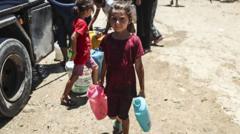Amid ongoing conflict, Israeli Defense Minister Israel Katz's plan to relocate Gaza's population to a camp in Rafah has sparked outrage, with allegations of potential human rights violations and comparisons to ethnic cleansing. The proposal highlights the complexity of international humanitarian law and local sentiments regarding displacement and war.
Israeli Defense Minister Advocates for Gaza Population Relocation to Rafah Camp

Israeli Defense Minister Advocates for Gaza Population Relocation to Rafah Camp
A controversial proposal emerges as Israel plans to establish a camp for displaced Palestinians in southern Gaza, raising ethical and legal concerns.
Israeli Defense Minister Israel Katz has reportedly instructed the military to develop a plan aimed at relocating all Palestinians living in Gaza to a camp in Rafah, according to Israeli media outlets. Katz envisions the establishment of a "humanitarian city" which would initially accommodate approximately 600,000 Palestinians, with aspirations to eventually house the entire population of 2.1 million. The intention behind the move is to ensure safety through security screenings of the population to exclude Hamas operatives, although the displaced individuals would not be allowed to leave the designated area.
The proposed plan has faced severe condemnation from human rights advocates. Prominent Israeli lawyer Michael Sfard characterized the initiative as an "operational plan for a crime against humanity," labeling it a strategy for population transfer that could lead to broader deportations outside Gaza. International humanitarian law, as articulated by the United Nations, strictly prohibits the forced transfer or deportation of civilian populations in occupied territories, citing it as "tantamount to ethnic cleansing."
In the absence of responses from the Palestinian Authority and Hamas, Israeli Prime Minister Benjamin Netanyahu discussed the matter during a meeting at the White House, referencing U.S. President Donald Trump's vision for Gaza’s post-war resettlement. Netanyahu described Trump’s plan as allowing Palestinians the "free choice" to either remain or leave. Highlighting potential collaboration with neighboring countries, Trump expressed optimism for a solution that would offer a better future for Palestinians.
Conversely, Arab states have rallied behind a $53 billion reconstruction alternative proposed by Egypt, which emphasizes the right of Palestinians to remain in their homes and categorically rejects the concept of their displacement. Both the Palestinian Authority and Hamas have expressed support for Egypt’s initiative, while the U.S. and Israel have criticized it for not addressing the complex realities on the ground.
The specter of displacement looms large in the Palestinian consciousness, invoking memories of the Nakba—the mass exodus of Palestinians during the 1948 Arab-Israeli conflict. Presently, around 900,000 registered refugees are located in the occupied West Bank, while approximately 3.4 million reside in Jordan, Syria, and Lebanon, as recorded by the United Nations.
The current Israeli military campaign, launched in response to a cross-border attack on October 7, 2023, which resulted in over 1,200 fatalities and 251 hostages, has already led to the deaths of more than 57,500 Palestinians according to the Hamas-run health ministry. The ongoing conflict has left most of Gaza's population displaced and in dire conditions, with over 90% of homes damaged or destroyed, compounded by the collapse of essential services including healthcare and sanitation. Assertions of food, fuel, medicine, and shelter shortages further exacerbate the humanitarian crisis facing the region.




















